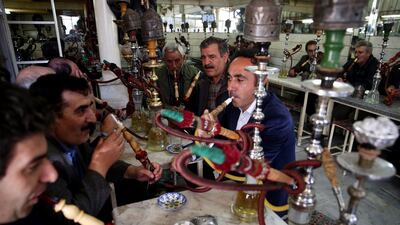Iran is one of the richest countries in terms of resources. Tehran enjoys the second and fourth largest gas and oil reserves in the world. Its abundance of natural resources provides Iran with powerful international leverage.
In addition, the lifting of sanctions has increased revenue and allowed Iran to rejoin the global financial system. But the reality on the ground is that economic growth has not been married to increased economic equity.
One of the core pillars of the Islamic Republic has been creating economic equality and social justice. In fact, one of the key reasons behind the fall of the shah was that Iranians felt that wealth was not being redistributed.
However, the widening gap between rich and poor is noticeable in major cities such as Tehran, Shiraz, Isfahan and the rest of the country.
Speaking on phone from an Iranian restaurant in which a meal without dessert costs roughly Dh1,065, Shirin, 34, whose husband is a business owner, pointed out: “We used to go almost every week to Dubai for holiday, but now me and my husband are travelling twice a month to places such as Paris, London and Amsterdam to go shopping, relax and have fun.”
Approximately 5 per cent of Iranians are extremely wealthy – families of high-ranking officials and owners of factories enjoy connections with the authorities and banks. This highlights the connection between the political establishment and money.
While the lifting of sanctions seems to be assisting those who were already wealthy, the trend is different once one moves away from the wealthy districts of Tehran. It seems as if we enter a different country. Meat, basic food and products that are needed for survival are considered luxuries for many hard-working Iranians.
“Since the sanctions have been lifted our life has become harder. The government is removing subsidies. For breakfast, we eat dried bread,” Ashkan, a primary schoolteacher who works part-time as a taxi driver, told me in a phone conversation.
Gholam, 63, a construction worker, said: “I have not been able to afford to replace my worn-out shoes and gloves for years. My hands and feet hurt a lot at night. I cannot afford to go and see a doctor and we sleep many nights with empty bellies. It is very hard in the winter.”
The relationship between the ruling politicians and wealth is also increasingly creating resentment among the poor.
“I see how some people are flaunting their wealth, spending millions on parties and restaurants. They drive different cars every week – Porsches and Mercedes,” Gholam said.
“Do they think it is good to behave like this in public and show off your wealth? The government also lets them do whatever they desire.”
Even Iran’s supreme leader Ali Khamenei referred to this socio-economic problem and warned in one his speeches against showing off wealth because it can “create psychological insecurity in society”.
The monthly average salary of Iranians is approximately $450. This is hardly sufficient to pay utilities and rent for a small one-bedroom apartment in an average area of Tehran.
The price of food, clothing and rent appear to be similar to those of the United States. But Iran’s average salary is roughly one-tenth of average salaries in America.
The sanctions were not the main factors behind the widening gap between rich and poor. Many Iranians are disappointed at the direction their government has taken.
Widespread corruption, nepotism, economic mismanagement, lack of government transparency and a state-controlled economy that blocks the poor from socio-economic growth and becoming middle class are the main reasons.
The flow of oil money is only benefiting the top ruling officials and the wealthy business class connected to it.
This socio-economic disparity is Iran’s major challenge that can endanger the power of the political establishment if appropriates measures – such as establishing safety nets, social protection mechanisms and addressing the corruption – are not adequately addressed.
Dr Majid Rafizadeh is an Iranian-American Harvard scholar and president of the International American Council on the Middle East
On Twitter: @dr_rafizadeh

